Questões de Língua Inglesa do ano 2017
Lista completa de Questões de Língua Inglesa do ano 2017 para resolução totalmente grátis. Selecione os assuntos no filtro de questões e comece a resolver exercícios.
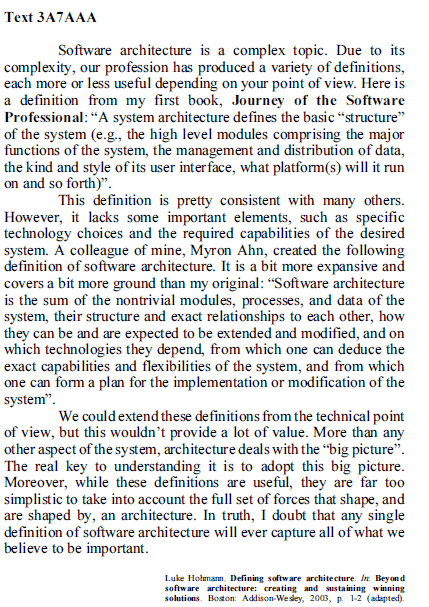 In the first line of text 3A7AAA, the expression Due to could be correctly replaced by
In the first line of text 3A7AAA, the expression Due to could be correctly replaced by
- A. In order to.
- B. More than.
- C. Owing to.
- D. In spite of.
- E. In addition to.
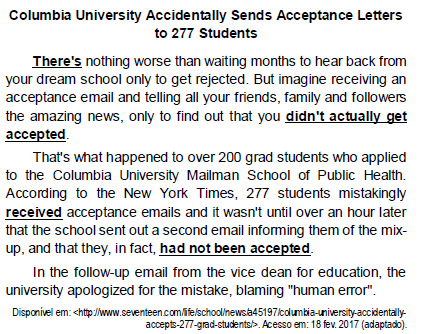
Os tempos verbais destacados correspondem, respectivamente, a:
- A. Present Simple / Past Simple Passive / Past Simple Active / Past Perfect Passive.
- B. Present Simple / Past Simple Passive / Past Simple Active / Present Perfect Passive.
- C. Present Simple / Past Simple Active / Past Simple Active / Present Perfect Passive.
- D. Present Perfect Active / Past Simple Passive / Past Perfect Active / Past Perfect Passive.
- E. Present Perfect Active / Past Simple Active / Present Simple / Past Perfect Active.
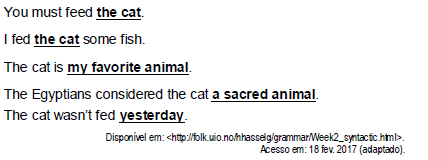
As funções sintáticas dos termos destacados são, respectivamente:
- A. Direct Object / Direct Object / Adjective / Object Predicative / Time Adverb.
- B. Direct Object / Direct Object / Adjective / Object Predicative / Time Adverb.
- C. Direct Object / Indirect Object / Subject Predicative / Object Predicative / Adverbial.
- D. Predicate / Direct Object / Subject Predicative / Object Predicative / Adverbial.
- E. Predicate / Direct Object / Adjective / Adjective / Time Adverbial Clause.
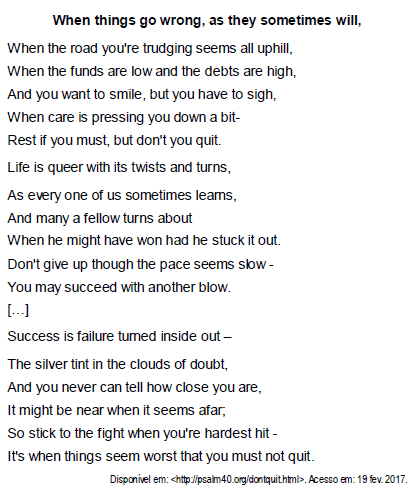
Assinale a alternativa que apresenta somente orações subordinadas adverbiais temporais (Time Clauses) e/ou orações condicionais (Conditionals).
- A. You want to smile, but you have to sigh / Rest if you must / He might have won had he stuck it out.
- B. Rest if you must / He might have won had he stuck it out / Stick to the fight when you're hardest hit.
- C. When the road you're trudging seems all uphill / Rest if you must / You may succeed with another blow.
- D. When care is pressing you down a bit / It might be near when it seems afar / You may succeed with another blow.
- E. You never can tell how close you are / It might be near when it seems afar / Stick to the fight when you're hardest hit.

No fragmento, os termos em destaque têm, respectivamente, as funções de
- A. substantivo / adjetivo / adjetivo.
- B. substantivo / verbo / adjetivo.
- C. adjetivo / substantivo / verbo.
- D. verbo / adjetivo / verbo.
- E. verbo / verbo / verbo.
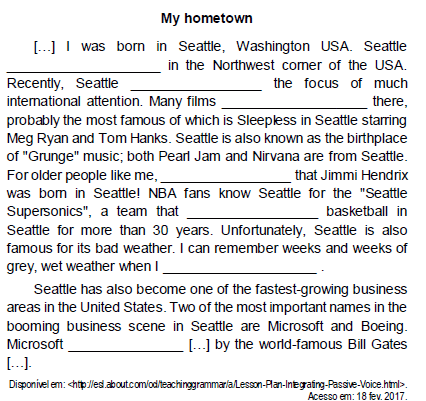
Qual a alternativa apresenta os preenchimentos corretos das lacunas no texto?
- A. was located / has become / have being made / it noticed / has played / grew up / has been founded.
- B. was located / has become / have being made / it noticed / has played / grew up / has been founded.
- C. is located / becomes / have being made / it notices / has been played / was grown up / has been founded.
- D. is located / has become / have been made / it should be noted / has played / was growing up / was founded.
- E. is located / became / have made / it should be noted / has been playing / was growing up / was founded.

As duas orações destacadas no fragmento são exemplos de
- A. condicional.
- B. voz passiva.
- C. verbo frasal.
- D. comparativo.
- E. discurso indireto.
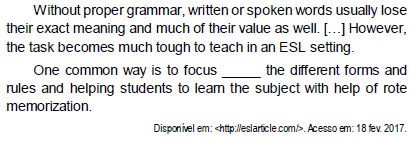
Qual preposição completa corretamente o texto?
- A. in.
- B. at.
- C. on.
- D. over.
- E. about.

No fragmento, o termo destacado é uma conjunção que indica
- A. adição.
- B. exclusão.
- C. oposição.
- D. condição.
- E. conclusão.
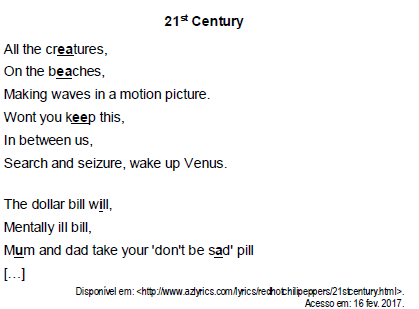
As partes destacadas têm seus símbolos fonéticos representados, respectivamente, em:
- A. /ɪ/ ; /ɪ/ ; /ɪ/ ; /i¢°/ ; /ʊ/ ; /e/
- B. /ɪ/ ; /ɪ/ ; /ɪ/ ; /i¢°/ ; /ʌ/; /©¡/
- C. /i¢°/ ; /i¢°/ ; /i¢°/ ; /ɪ/ ; /ʌ/; /©¡/
- D. /i¢°/ ; /i¢°/ ; /i¢°/ ; /ɪ/ ; /ʊ/; /©¡/
- E. /i¢°/ ; /i¢°/ ; /i¢°/ ; /ɪ/ ; /ʌ/; /e/


